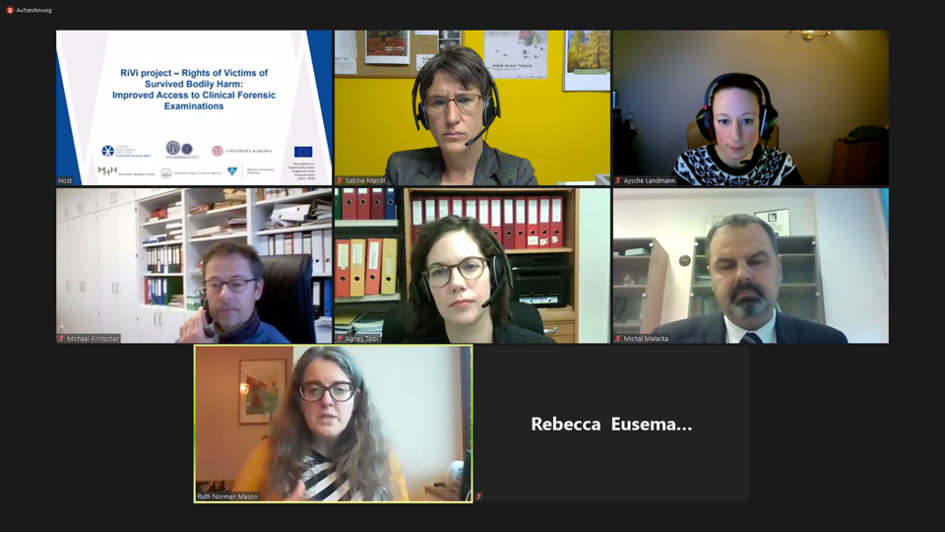ONLINE EVENT: RiVi – Rights of Victims of Survived Bodily Harm. Improved Access to Clinical Forensic Examinations
Within the scope of the EU-funded RiVi project “Rights of Victims of Survived Bodily Harm: Improved Access to Clinical Forensic Examinations”, an international awareness-raising event took place on 26 November 2020. Since February 2019, the RiVi project aims at strengthening the rights of victims of violence according to the EU Victims’ Rights Directive and sensitising relevant stakeholders for clinical forensic examinations, especially medical professionals. This is intended to improve access to such examinations as well as to secure comprehensive evidence in order to strengthen the position of the person in possible future legal proceedings.
Watch the recording of the plenary sessions here.
Moderated by Agnes Taibl, RiVi project coordinator at the Ludwig Boltzmann Institute of Fundamental and Human Rights, the online event featured lectures which highlighted the topic from different perspectives. At first, Michal Malacka, senior lecturer of private law at the Palacký Faculty of Law at the University of Olomouc in the Czech Republic, gave a comprehensive insight into the rights of victims of crime derived from the Victims’ Rights Directive 2012/29/EU. Sabine Mandl, scientific researcher at the Ludwig Boltzmann Institute of Fundamental and Human Rights and expert in the field of women’s rights and gender-based violence, then specified gender-based characteristics of violence as well as the women’s rights perspective. Thereafter, Kathrin Yen, medical director of the institute of Legal and Traffic Medicine at University Hospital in Heidelberg, Germany, gave a presentation on clinical forensic examinations, especially with regard to the recognition of symptoms and indicators of violence, securing evidence as well as appropriate documentation. Ruth Mason, Business and Development Lead at „Women’s Aid“ in London, pursued in her presentation the issue of communication with victims of violence as well as strategies of support. In doing so, she focused on client-centered communication and public support structures. Michael Klintschar, Head of the Institute of Forensic Medicine at Hannover Medical School in Germany, then presented the best practice example “ProBeweis” and illustrated how professional securing of evidence for victims of violence can be implemented in practice.
During the second part of the event, three interactive workshops were held, which dealt closer with the legal, medical and psychosocial dimensions. The participants had the possibility to choose one of the workshops and directly exchange with the speakers and the other participants.
The last agenda point of the online event was a closing plenary session where the speakers reported on the discussions in their workshops and highlighted some key points and recommendations.
Due to the diverse program and the different perspectives, the online event provided participants with a good overview on victim’s rights and the importance of clinical forensic examinations. The event thus made an essential contribution to raising awareness of the topic and to further sensitising relevant stakeholders for the issue.
The agenda of the online event and all Powerpoint presentations are accessible in the download section of this article. The recording of the plenary sessions can be watched here. In the course of the RiVi project, a short film as well as an online training on clinical forensic examinations were produced, which can be accessed by clicking on the links above.
